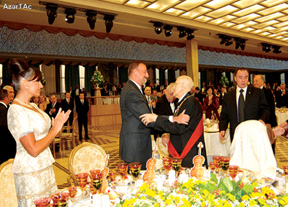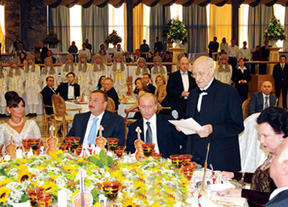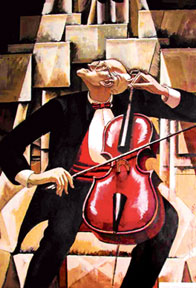|

Volume 15.1
Pages
16-17
Tribute
Remembering Rostropovich
Reflections by Cellist Yo-Yo Ma
National Public Radio (USA)
Interview with Yo-Yo Ma,
World-Renown Cellist
  This feature was broadcast on "All
Things Considered", a nationally syndicated program of National
Public Radio (NPR) in the United States on the date of Rostropovich's
death - April 27, 2007. The feature was entitled: "Yo-Yo
Ma Reflects on Rostropovich". To hear the voices of Mstislav
Rostropovich and Yo Yo Ma and to hear Rostropovich playing his
cello, SEARCH at NPR.org. Copyright NPR. Reprinted with permission.
Editor's Note: information inside squared parenthesis [] has
been added for fuller description. 8:18 minute segment. This feature was broadcast on "All
Things Considered", a nationally syndicated program of National
Public Radio (NPR) in the United States on the date of Rostropovich's
death - April 27, 2007. The feature was entitled: "Yo-Yo
Ma Reflects on Rostropovich". To hear the voices of Mstislav
Rostropovich and Yo Yo Ma and to hear Rostropovich playing his
cello, SEARCH at NPR.org. Copyright NPR. Reprinted with permission.
Editor's Note: information inside squared parenthesis [] has
been added for fuller description. 8:18 minute segment.
The cellist Mstislav Rostropovich
is being remembered as a man of passion, enormous energy and
talent. Rostropovich died today in Moscow at age 80.
  Left: Rostropovich playing at the Berlin Wall. Photo:
Wikipedia: New York Times credits Reuters. Left: Rostropovich playing at the Berlin Wall. Photo:
Wikipedia: New York Times credits Reuters.
Melissa Block: Rostropovich
told an interviewer several years ago: "All my life I  wanted to play music with love to every
member of the audience. Even if I have played the Dvorak Concerto
thousands of times, every time I reached the final pages, I have
tears in my eyes. It is so beautiful." wanted to play music with love to every
member of the audience. Even if I have played the Dvorak Concerto
thousands of times, every time I reached the final pages, I have
tears in my eyes. It is so beautiful."
Block: Here he is in an NPR interview from 1991 (Archived
NPR broadcast from 1991).
Mstislav Rostropovich (world-renown cellist and conductor; former
Musical Director of the National Symphony Orchestra in Washington,
D.C.): [Rostropovich speaking: exact quote in his broken English].
We realize our talent just this connection, emotional connection
to this people. I think for each performer, that's very important
how our people who are coming to our concerts, how feel this
people? Happy these people or not happy?
Rostropovich and his wife [sopranist Galina Vishnevskaya, born
1926] left the Soviet Union in 1974 and were stripped of their
citizenship [1978]. Rostropovich, whom his friends called "Slava",
was musical director of the National Symphony Orchestra in Washington
D.C. for nearly 20 years [1977-1994]. And when he returned to
Russia for the first time in 1990 [the year before the collapse
of the Soviet Union], the first thing he did was go to visit
the grave of Dmitri Shostakovich [in Moscow].
 |
 |
Above left: Azerbaijan's President Ilham Aliyev
at the celebration of Rostropovich's 80th birthday in Moscow
on March 27, 2007, exactly one month before Rostropovich died.
First Lady Mehriban Aliyeva looks on. Credit to Azertaj.
Above right: Birthday guests, left to right: Azerbaijan's
First Lady with President Ilham Aliyev, Russia's President Vladimir
Putin, Mstislav Rostropovich (standing), with his wife, the Opera
Sopranist Galina Vishnevskaya.
Credit to Azertaj.
  It was this1961 recording of Rostropovich's
playing a piece written for him by Shostakovich - his first Cello
Concerto [Opus 107 in E-flat, 1959] - that electrified a 15-year-old
budding cellist named Yo Yo Ma. It was this1961 recording of Rostropovich's
playing a piece written for him by Shostakovich - his first Cello
Concerto [Opus 107 in E-flat, 1959] - that electrified a 15-year-old
budding cellist named Yo Yo Ma.
Yo Yo Ma (world-renown cellist):
That recording just made my hair stand on end. I couldn't sleep
that night. I think it was the combination of energy - and to
a player, a cellist, a fellow cellist - the impossibility of
what he was doing on the instrument. Beyond physical ability,
there was a kind of will power that was so grand. It was overwhelming.
You know, it was kind of a distortion of reality. You enter into
that - his sound world - or you see him in person, and something
happens and you fall under his spell.
Block: You came to work with him many times over the
years.
Yo Yo Ma: I first met him in 1976, so I've known him for
about 31 years. He came to college [Julliard] and gave a Master
Class. And boy, he took no prisoners. He immediately zeroed in
on my weaknesses and proved to me that I didn't know what was
happening in the score, even though I was trying to wiggle out
of admitting it. Basically it was one of those things where someone
enters your life and tells you the things that other people have
been telling you but because it's that person, it makes you pay
attention much more.
Above:
Painting of Rostropovich
by Azerbaijan painter Tahir Salahov (born 1928), who is a contemporary
of Mstislav Rostropovich. The original, painted in 1999, is on
display at the Leopold and Mstislav Rostropovich Home Museum
in Baku.
And then I played with
him at the National Symphony, the following year. Over the years,
we would visit each other. He would give me advice about music
such as offering a secret program at the Lutoslawski Concerto,
which he commissioned.
In many ways his generosity was often practical. Just say or
do this. You go to a city. This is the way you should play or
project. And in that sense, I was very grateful. I still am very
grateful for those personal interactions.
Block: Was it the kind of thing that even late in his
life when your own career had clearly skyrocketed that you were
still able to learn things from him?
Yo Yo Ma: I think one of the great things about
being a musician is that you never stop learning. That reminds
me of one of the things Slava used to say. He would say: 'I went
to three universities - the universities of Prokofiev, Shostakovich
and Britten' [Benjamin 1913-1976]. And it was his deep friendship
and his working relationship with these three composers that
opened different kinds of world knowledge to him.
And I think Rostropovich was always a proponent of continuous
learning. I think to the very end, he was premiering new works.
It absolutely amazed me. You know, at 51, it's hard for me to
learn new pieces, but he would not only learn them, he would
memorize them and, of course, ingest them in such a way that,
you know, he would own the pieces.
As a cellist, we're all so incredibly grateful to him because
single-handedly, he changed the landscape of the cello repertoire
by adding maybe 40 percent to it. And he taught fabulous students
that are inspired artists as well as nurturing teachers.
Block: I've been listening to his 1991 recording of
the "Bach's Cello Suite," which he recorded in a church
in Vezelay, France. And I've been noticing his breathing. You
get a sense - at least I do when listening to this - of the huge
life force going through him as he plays.
Yo Yo Ma: Yes. That life force, I think comes
from intention and thought. So it's not just technique but it's
much more of what he aimed at - the narrative that he wants us
to understand. So playing Bach at the Vezelay Church in Burgundy
[France], it's a great wine region, one of the great cathedrals.
It's typical Slava that he would record it in such a place. But
that recording also is so suitable for Bach in the creation of,
essentially, a musical cathedral.
But that's because of the way that Slava thought. And I think
it's the way that he lived his life. He had a huge appetite for
life, and I think what he gives to us in his music is a term
that he coined himself. He called himself "a foot soldier
in the service of music", and I think of him in that sense
as a foot soldier reporting on the triumphs and tragedies of
the world.
Block: Yo Yo Ma, thanks very much for being with us.
Yo Yo Ma: Thank you.
Block: Yo Yo Ma - remembering his fellow cellist, Mstislav
Rostropovich, who died today in Moscow at age 80. Rostropovich
will be buried in Novodevichy Cemetery [Moscow], which also holds
the graves of his teachers Dmitri Shostakovich and Sergei Prokofiev.
For a guide to Rostropovich's recordings and to watch a video
of him playing Bach, SEARCH: NPR.org.
_____
Back to Index AI 15.1
AI Home
| Search | Magazine
Choice
| Topics
| AI Store | Contact us
Other Web sites
created by Azerbaijan International
AZgallery.org | AZERI.org | HAJIBEYOV.com
|





